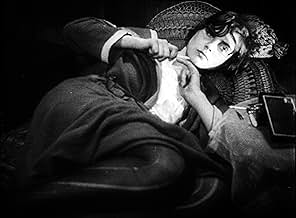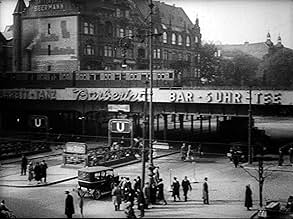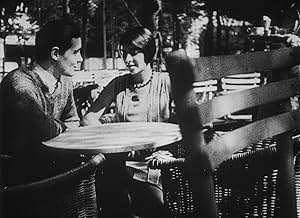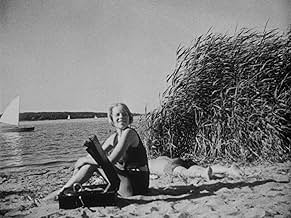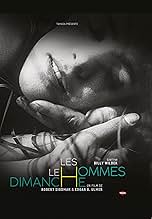CALIFICACIÓN DE IMDb
7.3/10
3.8 k
TU CALIFICACIÓN
Dos hombres y dos mujeres disfrutan de un agradable domingo en la playa al final de una ardua semana de trabajo.Dos hombres y dos mujeres disfrutan de un agradable domingo en la playa al final de una ardua semana de trabajo.Dos hombres y dos mujeres disfrutan de un agradable domingo en la playa al final de una ardua semana de trabajo.
Kurt Gerron
- Self
- (sin créditos)
Valeska Gert
- Self
- (sin créditos)
Heinrich Gretler
- Self
- (sin créditos)
Moriz Seeler
- Photo Subject at Beach
- (sin créditos)
Ernö Verebes
- Self
- (sin créditos)
Opiniones destacadas
A German silent curio heralds several future magnates of the film industry in Hollywood, PEOPLE ON Sunday is the debut feature for both its directors Robert Siodmak and Edgar G. Ulmer, with a script from a tender-age Billy Wilder and Fred Zinnemann in the camera branch. It is a bracing urban symphony of Berlin during the interwar times, confining its time-frame within a weekend, convenes a cast of five non-professional young actors (who are essentially playing themselves) and blithely breaking the boundary of studio lot and taking the story onto the streets of the metropolis, from a rush-hour Behnhof Zoo train station near the beginning to the movie's main course, a Sunday outing in Wannasee.
The quintet are Erwin, a taxi driver, his model wife Annie, and his friend Wolfgang, a wine dealer, then Christl, a film extra Wolfgang accosts in the said train station and Brigitte, her friend, who works in a record shop. Throughout its simple plot structure, the narrative heartily proceeds with a bifurcating stratagem, a plump, honest-looking Erwin's squabble-plagued marital life with a languorous Annie in their pokey bedsit, contrasting with a louche Wolfgang's pat oscillation in wooing either Christl or Brigitte, furthermore, a tangible rift is wondrously evinced between the two flappers, Christl is the prim and proper type, who naturally spurns Wolfgang's advances in the well-orchestrated lake-swimming sequences, but when she notices that Wolfgang takes his offensive towards a more skittish Brigitte and the two become lovey-dovey, she can barely contain her pique, not only to Wolfgang, but also to her girlfriend.
Yet, what leaves the most piquant tang is a thoroughgoing embodiment of machismo by the two male creatures, Erwin is the off-limits married man, both girls give him a decent berth, humbled by a comparatively more good-looking and athletic Wolfgang, he knows his role very well, a sausage juggler for laughter, a cavalier company, completely forgets about Annie's absence when there are new girls around, but also seemingly attests that, when sex is off the table, girls are just girls, no further communication is worth his effort. Wolfgang is more or less more readable, cops a feel whenever he can find a chance but will not get his feet wet into a stable relationship, and if a girl becomes too pushy, there is always a Sunday football match he can attend with his buddy Erwin.
A lilting juvenilia robustly interpolates expressionistic portraiture and vignettes (there are some very impressive close-ups both in still and in motion should be attributed to the young but ingenious film crew) in all the larking and perambulating, PEOPLE ON Sunday can still turn heads not just as a chirpy comedy, but also, a counter-time escapist prose because unfortunately we cannot blot out the fact that something egregiously sinister was incubating in that touchy era and that particular country.
The quintet are Erwin, a taxi driver, his model wife Annie, and his friend Wolfgang, a wine dealer, then Christl, a film extra Wolfgang accosts in the said train station and Brigitte, her friend, who works in a record shop. Throughout its simple plot structure, the narrative heartily proceeds with a bifurcating stratagem, a plump, honest-looking Erwin's squabble-plagued marital life with a languorous Annie in their pokey bedsit, contrasting with a louche Wolfgang's pat oscillation in wooing either Christl or Brigitte, furthermore, a tangible rift is wondrously evinced between the two flappers, Christl is the prim and proper type, who naturally spurns Wolfgang's advances in the well-orchestrated lake-swimming sequences, but when she notices that Wolfgang takes his offensive towards a more skittish Brigitte and the two become lovey-dovey, she can barely contain her pique, not only to Wolfgang, but also to her girlfriend.
Yet, what leaves the most piquant tang is a thoroughgoing embodiment of machismo by the two male creatures, Erwin is the off-limits married man, both girls give him a decent berth, humbled by a comparatively more good-looking and athletic Wolfgang, he knows his role very well, a sausage juggler for laughter, a cavalier company, completely forgets about Annie's absence when there are new girls around, but also seemingly attests that, when sex is off the table, girls are just girls, no further communication is worth his effort. Wolfgang is more or less more readable, cops a feel whenever he can find a chance but will not get his feet wet into a stable relationship, and if a girl becomes too pushy, there is always a Sunday football match he can attend with his buddy Erwin.
A lilting juvenilia robustly interpolates expressionistic portraiture and vignettes (there are some very impressive close-ups both in still and in motion should be attributed to the young but ingenious film crew) in all the larking and perambulating, PEOPLE ON Sunday can still turn heads not just as a chirpy comedy, but also, a counter-time escapist prose because unfortunately we cannot blot out the fact that something egregiously sinister was incubating in that touchy era and that particular country.
Five non-professional actors star in this tale of a typical Sunday idyll in and around Berlin. We meet taxi driver Erwin Splettstober, wine salesman Wolfgang von Waltershausen, music store clerk Brigitte Borchert, film extra Christl Ehlers, and model Annie Schreyer, attractive young people who are looking to relax on a sunny Sunday. The first four travel out to the country for a frolic in and around a lake, during which romantic attachments are formed and lost. This is cut together with documentary footage of average German citizens enjoying their Sunday in various ways.
This hard-to-classify effort has a stellar line-up behind the scenes: Billy Wilder and Curt Siodmak worked on the screenplay, the direction was by Robert Siodmak and Edgar G. Ulmer, and an uncredited Fred Zinnemann worked on various aspects of the movie, as well. The cinematography, although primitive and obvious in its trickery (I'm thinking of the often reflected light creating a sun-dappled effect on the actors' faces), has a modernity and immediacy seldom seen in films of the time. I think my favorite sequence of the film was a montage of close-up faces, of all shapes and sizes, of people around the lake. Recommended.
This hard-to-classify effort has a stellar line-up behind the scenes: Billy Wilder and Curt Siodmak worked on the screenplay, the direction was by Robert Siodmak and Edgar G. Ulmer, and an uncredited Fred Zinnemann worked on various aspects of the movie, as well. The cinematography, although primitive and obvious in its trickery (I'm thinking of the often reflected light creating a sun-dappled effect on the actors' faces), has a modernity and immediacy seldom seen in films of the time. I think my favorite sequence of the film was a montage of close-up faces, of all shapes and sizes, of people around the lake. Recommended.
On a Sunday, four young befriended people make an excursion to the lake Wannsee in Berlin to spend their free time in the sun with boat trips, bathing and flirting.
This low budget production demands to remain at the surface of everyday life and to show certain scenes, coincidences and trivialities of it. It is mostly interested in the details and shows the other side of the hectic, restless Berlin - the peace of a summerly Sunday. Here, the people are removed from the daily rush, and it is discernible how the makers agree with their protagonists. They celebrate the self-confidence of the young generation - which is not yet overshadowed by the big crisis at the beginning of the 1930s - and demonstrate the physical joy of life, the carefreeness and playfulness. The other side of this urban way of life is, which apparently only banks on superficialness and the momentary, promiscuity and the wounds coming from this, the harshness and the cold of changing feelings. It's cynically depicted in one long tracking shot over tree-tops (indicating symbolically sexual intercourse) that ends at a pile of thoughtlessly ditched trash.
This low budget production demands to remain at the surface of everyday life and to show certain scenes, coincidences and trivialities of it. It is mostly interested in the details and shows the other side of the hectic, restless Berlin - the peace of a summerly Sunday. Here, the people are removed from the daily rush, and it is discernible how the makers agree with their protagonists. They celebrate the self-confidence of the young generation - which is not yet overshadowed by the big crisis at the beginning of the 1930s - and demonstrate the physical joy of life, the carefreeness and playfulness. The other side of this urban way of life is, which apparently only banks on superficialness and the momentary, promiscuity and the wounds coming from this, the harshness and the cold of changing feelings. It's cynically depicted in one long tracking shot over tree-tops (indicating symbolically sexual intercourse) that ends at a pile of thoughtlessly ditched trash.
This silent semi-documentary boasts quite a remarkable roster of young talent behind the camera: Billy Wilder, writing his first screenplay; Curt and Robert Siodmak at the helm, aided by contributions from Edgar G. Ulmer and Fred Zinnemann – all of them still in their twenties, all at the beginning of notable careers. The most interesting aspect in front of the camera is the shots of everyday life in Berlin immediately before Adolf Hitler's meteoric rise to power. Many of the people you see going about their ordinary, everyday lives – including possibly the young leads – will have participated in the war into which Hitler would plunge their country in nine short years – or been consigned to concentration camps from which they'd never emerge.
The plot is virtually non-existent: a couple of young men take a couple of young girls to the park for a little frolicking in the lake (and something a little more intense for one couple). The characters are curiously remote, making it difficult for the audience to get to know – or like – them. They are no heroes or villains as such – although there is an air of callousness about the men – so perhaps in a way, this apparent decision to keep at the audience at arm's length can be seen as one of the film's strengths – a reflection of people the way they are (the leads were all non-actors, plucked from obscurity for their brief moment of film stardom before returning back to lives of anonymity). This sense of emotional detachment persists even when the film reaches its most sensuous moments, possibly because Wilder et al fail to decide whether they are telling us a story about people as a group or people as individuals and thus devote inadequate time and attention to both.
The plot is virtually non-existent: a couple of young men take a couple of young girls to the park for a little frolicking in the lake (and something a little more intense for one couple). The characters are curiously remote, making it difficult for the audience to get to know – or like – them. They are no heroes or villains as such – although there is an air of callousness about the men – so perhaps in a way, this apparent decision to keep at the audience at arm's length can be seen as one of the film's strengths – a reflection of people the way they are (the leads were all non-actors, plucked from obscurity for their brief moment of film stardom before returning back to lives of anonymity). This sense of emotional detachment persists even when the film reaches its most sensuous moments, possibly because Wilder et al fail to decide whether they are telling us a story about people as a group or people as individuals and thus devote inadequate time and attention to both.
Extraordinary and very simple silent film, put together by some of the most remarkable talents of Twentieth Century Cinema - just read those credits! Within a few years most of these people were in Hollywood, and Hitler had destroyed both the wonderful film industry they had helped build and the joyous Berlin that this film depicts.
The film tells the story of four strangers, two men and two women, enjoying a lazy Sunday by a lake in Berlin. Nothing much seems to happen, but there is a lot going on, as the four interact. There is innocence, the potential for love, the danger of sex, the force of jealousy and the pain of longing. And through it all is the joy of living!
Magnificently shot - largely in extreme close-up - the film allows us a glimpse of Berlin between the wars and it is sad to watch it with the knowledge of what was soon to be. It would have been impossible to make this film with dialogue - the words would have destroyed the nuance and the emotion. It reveals the power of silent cinema.
If the print you see is without a soundtrack, as mine was, then may I recommend playing the Essential Marlene Dietrich during the film. I did this and the combination was unforgettable.
The film tells the story of four strangers, two men and two women, enjoying a lazy Sunday by a lake in Berlin. Nothing much seems to happen, but there is a lot going on, as the four interact. There is innocence, the potential for love, the danger of sex, the force of jealousy and the pain of longing. And through it all is the joy of living!
Magnificently shot - largely in extreme close-up - the film allows us a glimpse of Berlin between the wars and it is sad to watch it with the knowledge of what was soon to be. It would have been impossible to make this film with dialogue - the words would have destroyed the nuance and the emotion. It reveals the power of silent cinema.
If the print you see is without a soundtrack, as mine was, then may I recommend playing the Essential Marlene Dietrich during the film. I did this and the combination was unforgettable.
¿Sabías que…?
- TriviaThe film was a major hit when it was released in Germany in 1930. Five of the people who worked on the film went on to direct films in Hollywood: Curt Siodmak, his brother Robert Siodmak, Edgar G. Ulmer, Fred Zinnemann and Billy Wilder.
- ErroresWhen the movie star picture cards are torn off the wall, the number of cards still on the wall constantly changes. Sometimes more cards are still on the wall than in the shot before etc.
- ConexionesFeatured in Histoire(s) du cinéma: Toutes les histoires (1988)
Selecciones populares
Inicia sesión para calificar y agrega a la lista de videos para obtener recomendaciones personalizadas
- How long is People on Sunday?Con tecnología de Alexa
Detalles
- Tiempo de ejecución1 hora 13 minutos
- Color
- Mezcla de sonido
- Relación de aspecto
- 1.20 : 1
Contribuir a esta página
Sugiere una edición o agrega el contenido que falta

Principales brechas de datos
By what name was Menschen am Sonntag (1930) officially released in India in English?
Responda

